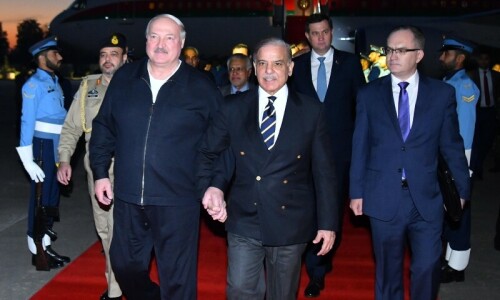MINGORA: The picturesque valley of Swat, which remained in the news owing to militant activities in the recent past, has become ‘home of olive’ as hundreds of thousands wild olive plants have been converted into original ones during the last one decade.
Under a seven-year project of Pakistan Oilseed Development Board (POBD), initiated in 2001, more than 0.6 million wild olive plants were converted into original European type in Swat, said an agriculture expert.
However, after the dissolution of ministry of food security and research at federal level, the provinces were not prepared to carry on the projects initiated by the centre.
The former regional manager of PODB, Fazl Maula Zahid, told Dawn that edible oil was Pakistan’s largest food import commodity. “It is second on the import list after petroleum and its products,” he added.
Mr Zahid said that Pakistan imported edible oil worth $2 billion in the year 2012 that would jump to $4 billion by 2016. He said that olive was one of the major contributor plants that could fulfil the requirement of the entire country in edible oil sector. Keeping in view the importance of olive, the federal government approved a seven-year mega project of Rs186.379 million in 2001-02 to convert eight million wild olives plants into original European type.
Similarly, a four-year project on ‘Development of olive model farm for olive research and development activities’ with a cost of Rs37.707 million was completed in June 2011, Zahid said. He added that a two-year project ‘Promotion and commercialisation of olive in Pakistan’ funded by Italy was also completed at a cost of Rs 80.00 million in 2011.
The former PODB official said that Swat was home of olive where they converted over 0.6 million wild olive plants into original European type since 2001. He added that olive gardens had been set up on about 600 acres in different areas of Swat where 28,000 spices of olive had been planted for the first time in the history of the country.Mr Zahid said that wild olive plants were converted into original ones in different parts of the country including Khyber Pakhtunkhwa, Balochistan and Potohar region. He said if the project was sustained even after the 18 Amendment, there was hope that Pakistan would stop importing edible oil for which it was spending more than $2 billion annually.
“Unfortunately the project has now been left without any supervision of the government,” he said and added that there was fear that due to reversal process the European olive plants in Swat and other parts of the country would once again converted into wild ones.
Olive cultivation was initiated in 1980’s in Swat, Waziristan and Mansehra under a small Italian-funded project. The orchards set up under the said project could not survive owing to lack of proper management practices, awareness and marketing. The director of institute of plants sciences at University of Swat, Dr Hassan Sher said that Swat was the most suitable place for olive cultivation. Wild olive plants were present at large scale from Malakand top to Bahrain, he added.
Dr Sher said that the weather was major factor for proper growth of medicinal plants. Due to its favourable weather Swat was considered the most important area in agriculture sector, he added.
Dr Sher said that National Olive Research Development Unit was set up at University of Swat to conduct and facilitate research in the relevant field and initiate work for converting wild olive into original European and Spanish types.
“We have contacted the Embassy of Italy in Islamabad to seek financial support for the proposed project on olive research,” Dr Sher said.
Abdul Haq, a farmer from Charbagh area, said that he had converted more than 1000 wild olive plants into original ones. He added that owing to lack of open market for olive, the farmers could not get due return. He said that most of the farmers in Swat were compelled to use olive in pickle.











































